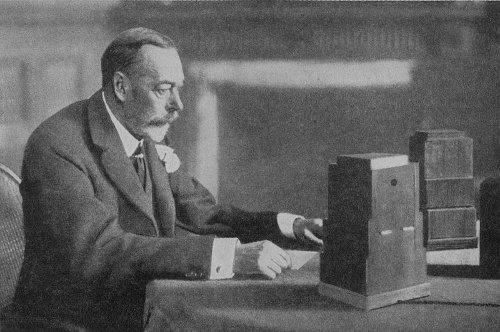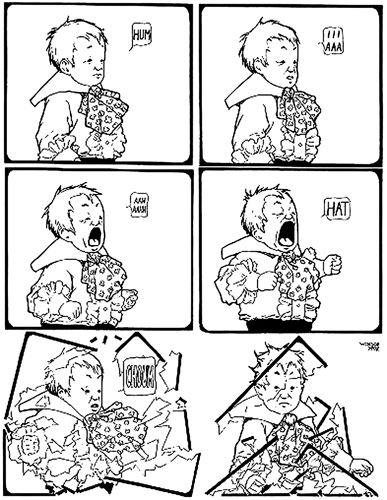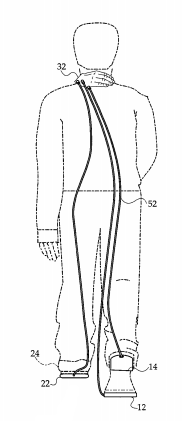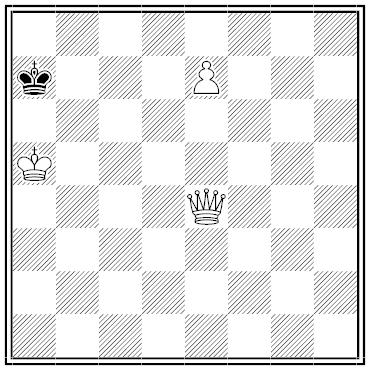I place four balls in a hat: a blue one, a white one, and two red ones. Now I draw two balls, look at them, and announce that at least one of them is red. What is the chance that the other is red?
Hearsay

“Lord Dawson was not a good doctor. King George V himself told me that he would never have died had he had another doctor.” — Margot Asquith, to the young Lord David Cecil
Dark Days
From an 1863 interview with blacksmith Solomon Bradley regarding the punishment of slaves in South Carolina:
Q. Can you speak of any particular cases of cruelty that you have seen?
A. Yes, sir; the most shocking thing that I have seen was on the plantation of Mr. Farrarby, on the line of the railroad. I went up to his house one morning from my work for drinking water, and heard a woman screaming awfully in the door-yard. On going up to the fence and looking over I saw a woman stretched out, face downwards, on the ground her hands and feet being fastened to stakes. Mr. Farrarby was standing over and striking her with a leather trace belonging to his carriage-harness. As he struck her the flesh of her back and legs was raised in welts and ridges by the force of the blows. Sometimes when the poor thing cried too loud from the pain Farrarby would kick her in the mouth. After he had exhausted himself whipping her he sent to his house for sealing wax and lighted candle and, melting the wax, dropped it upon the woman’s lacerated back. He then got a riding whip and, standing over the woman, picked off the hardened wax by switching at it. Mr. Farrarby’s grown daughters were looking at all this from a window of the house through the blinds. This punishment was so terrible that I was induced to ask what offence the woman had committed and was told by her fellow servants that her only crime was in burning the edges of the waffles that she had cooked for breakfast. The sight of this thing made me wild almost that day. I could not work right and I prayed the Lord to help my people out of their bondage. I felt I could not stand it much longer.
From John W. Blassingame, Slave Testimony, 1977.
Bench Test

In 1976, Queen Elizabeth College chemist Leslie Hough asked graduate researcher Shashikant Phadnis to test a certain chlorinated sugar compound. Phadnis, whose English was imperfect, “thought I needed to taste it! … So I took a small quantity of the sample on a spatula and tasted it with the tip of my tongue.”
To his surprise, Phadnis found the compound intensely and pleasantly sweet. When he reported his discovery to Hough, “‘Are you crazy or what?’ he asked me. ‘How could you taste compounds without knowing anything about their toxicity?'” After some further cautious tasting, Hough dubbed the compound Serendipitose. It became the artificial sweetener Splenda.
“Later on, Les even had a cup of coffee sweetened with a few particles of Serendipitose. When I reminded him that it could be toxic (as it contained a high proportion of chlorine), he simply said, ‘Oh, forget it, we’ll survive!'”
Progress
Letter to the Times, Oct. 18, 1968:
Sir,
This afternoon I caught the 15:05 train from the recently modernized Euston Station.
According to the new electronic departure indicator, its destination was Rugby; according to the ticket collector and a notice on the platform it was Coventry; according to the destination blind on the train it was Wolverhampton. I got off at Watford to hear the station announcer declare it was Wolverhampton and walked home to look it up in my copy of the timetable and discover it was Birmingham.
Perhaps now that their modernization scheme is complete British Rail’s executives will have enough time to decide where their trains are going to?
Yours faithfully,
Richard Harvey
Related: NATIONAL RAIL TIMETABLES is an anagram of ALL TRAINS AIM TO BE LATE IN.
Haste, Waste

On Sept. 21, 1956, Navy pilot Tom Attridge put his supersonic F11F Tiger into a shallow dive and test-fired two bursts from its 20mm cannon. Unfortunately, the jet was traveling so fast that it overtook its own rounds. One struck the engine, which failed on the way back to the airfield. Attridge crash-landed, losing a wing and a stabilizer but getting away safely. His Tiger had become the first jet aircraft to shoot itself down.
A puzzle sent to me by a Caltech grad student: A man is walking his dog on the beach. Each time he blows a whistle, the dog doubles its speed. If the dog starts at 2 meters per second, how many whistles does it hear? Answer: Fifteen — when the dog exceeds the speed of sound, it catches up with the earlier whistles.
(Thanks, John and Srivatsan.)
Black and White
The Paradox of Fiction

How can we be moved by the fate of Anna Karenina when we know she’s not a real person?
In order to have an emotional response to a character or event, we must believe that it really exists. We know that this belief is lacking when we read a work of fiction. Yet we’re commonly moved by such works. Why?
It can’t be the case that we’re simply “caught up” in a story and forget that it’s fiction. If that were true then the fear, sadness, and pity we feel should be unpleasant rather than enjoyable. (Also, we’re not moved to intervene and help a fictional character.)
University of Kent philosopher Colin Radford concludes that our emotional responses to fiction are ultimately irrational, that “our being moved in certain ways by works of art, though very ‘natural’ to us and in that way only too intelligible, involves us in inconsistency and so incoherence.”
See Push and Pull.
In a Word

ptarmic
n. that which causes sneezing
Walk Therapy

Brent Gunnon’s “foot-pump-powered neck-massaging device,” patented in 2002, connects bladders in the wearer’s shoes to a massaging hand that he fits to his neck. The back of his neck, one hopes.

